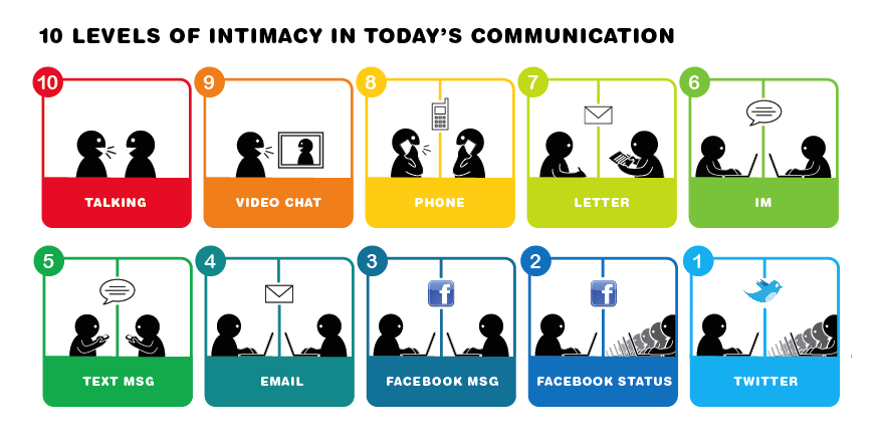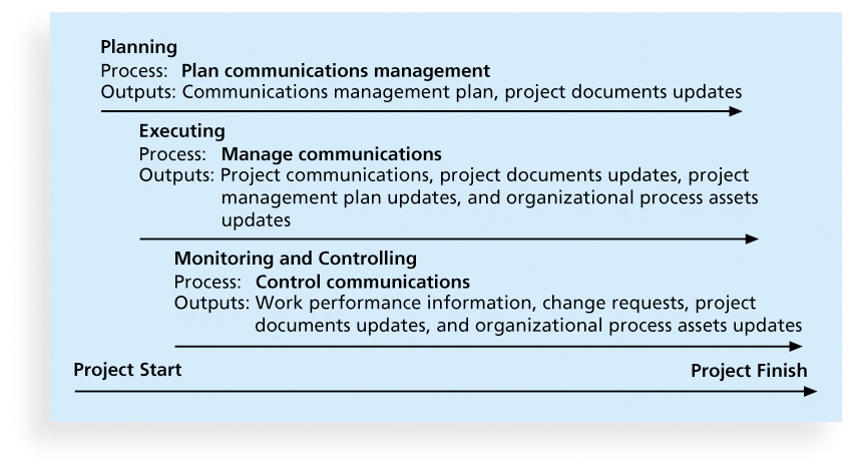Project Communication Management Back

1. Processes

- Planning communications management
- Communications Management Plan Contents
- Stakeholder communications requirements
- Information to be communicated, including format, content, and level of detail
- Who will receive the information and who will produce it
- Suggested methods or technologies for conveying(傳達) the information
- Frequency of communication
- Escalation(升級) procedures for resolving issues
- Revision procedures for updating the communications management plan
- A glossary(詞匯表) of common terminology(術語)
- Communications Management Plan Contents
- Managing communications
- Determining the number of communications channels:
- channels = n(n-1) / 2
- Classifications for communication methods:
- Interactive communication
- Push communication
- Pull communication
- Determining the number of communications channels:
- Controlling communications
2. Understanding Group and Individual Communication Needs
- As illustrated in Brooks' book The Mythical Man-Month(人月神話), you cannot assume that a task originally scheduled to take two months of one person's time can be done in one month by two people.
- Nine women cannot produce a baby in one month!
3. Running Effective Meetings
- Determine if a meeting can be avoided
- Define the purpose and intended outcome of the meeting
- Determine who should attend the meeting
- Provide an agenda(議程) to participants before the meeting
- Prepare handout(會議文字資料) and visual aids, and make logistical arrangements(後勤安排) ahead of time
- Run the meeting professionally
- Set the ground rules(基本原則) for the meeting
- Build relationships
4. Lessons Learned(經驗總結) Reports
- The project manager and project team members should each prepare a lessons-learned report.
5. Project Archives(檔案)
- Project archives are a complete set of organized project records that provide an accurate history of the project.
6. Q&A
- Managing communications is part of the which process of the project communication management?
- closing
- planning
- executing
- monitoring and controlling
answer: executing.
- As a manager, you want to praise a team member, Phil, for doing a good job on a particular project. However, you know that Phil tends to be an introvert. Which of the following communication methods would Phil be most comfortable with?
- Call Phil in for a private meeting to appreciate his work.
- Announce Phil's accomplishment on the company Web site.
- Call a team meeting to praise Phil for his work on the project.
- Have top management and the other teams in the company award Phil.
answer: Call Phil in for a private meeting to appreciate his work.
- Which of the following communication methods would be most appropriate for assessing the commitment of project stakeholders?
- Wikis
- Web sites
- Meetings
answer: Meetings.
- According to the guidelines provided by Practical Communications, Inc., what is a medium that is "excellent" for encouraging creative thinking?
- phone call
- meeting
- Web Site
answer: e-mail.
- According to the guidelines provided by Practical Communications, Inc., what is the most inappropriate medium for addressing negative behavior?
- voice mail
- meeting
- Web Site
answer: meeting.
- According to the guidelines provided by Practical Co, which address where the project stands in terms of meeting scope, time, and cost goals?
- Technical reports
- Progress reports
- Status reports
- Lessons-learned reports
answer: Status reports.
- What describe where the project stands at a specific point in time?
- Progress reports
- Forecasts
- Status reports
- Lessons-learned reports
answer: Status reports.
- What describe what the project team has accomplished during a certain period?
- Progress reports
- Forecasts
- Status reports
- Lessons-learned reports
answer: Progress reports.
- What predict future project status and progress based on past information and trends?
- Progress reports
- Forecasts
- Status reports
- Project updates
answer: Forecasts.
- Which of the following questions is typically addressed by a project forecast?
- How much more money will be needed to complete the project?
- Are our clients satisfied with the speed and quality of work on this project?
- Does the quality of output match our goals?
- How comfortable are employees with the software and technology being used on the project?
answer: How much more money will be needed to complete the project?
- E-mail communication is most suited for:
- assessing commitment to a project.
- mediating a conflict between multiple parties.
- building consensus among disputing parties.
- communicating routine information.
answer: communicating routine information.
- Which line for any e-mail messages you write should clearly state the intention of the e-mail?
- to
- subject
- from
- cc
answer: subject.
- Which of the following is a guideline that project managers should follow when communicating with their teams through e-mail?
- Always reply to all the people to whom the initial message was sent.
- If the entire message can fit in the subject line, put it there.
- Minimize the total number of e-mails by including as many subjects as possible in a single e-mail.
- Continue replying to e-mail messages without changing the subject line to maintain continuity.
answer: If the entire message can fit in the subject line, put it there.
- What are a complete set of organized project records that provide an accurate history of the project?
- Project archives
- Project plans
- Forecasts
- Project notes
answer: Project archives.